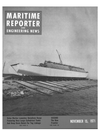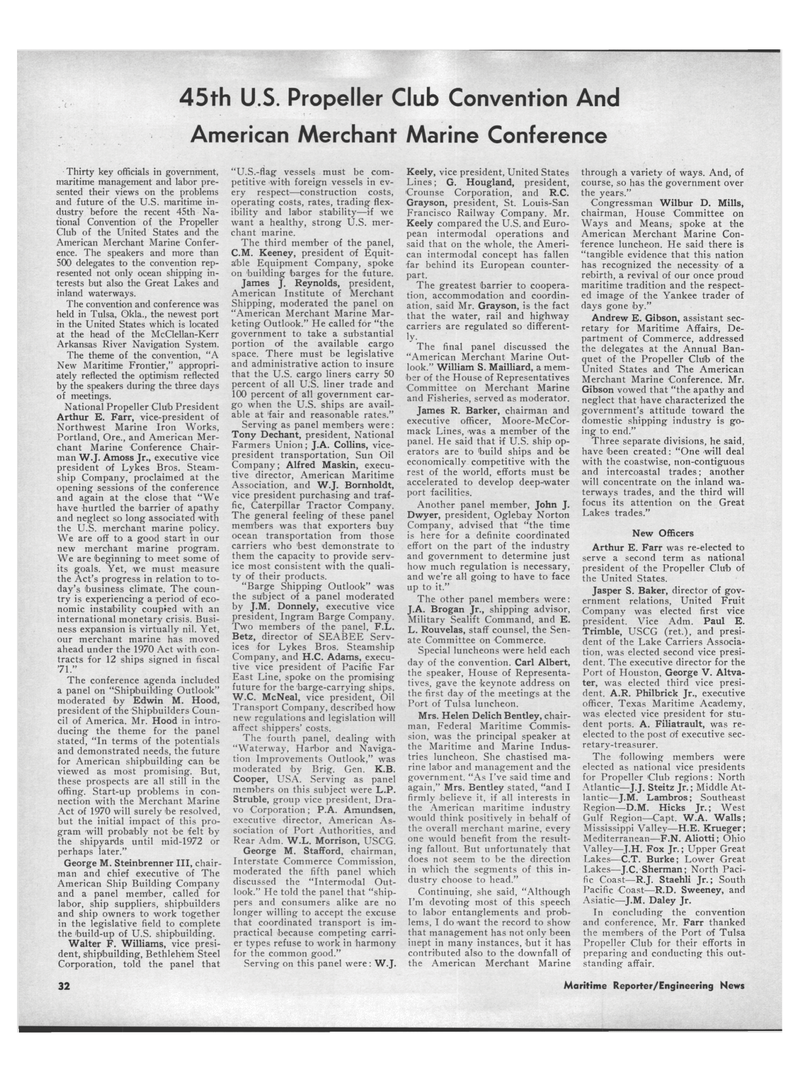
Page 30: of Maritime Reporter Magazine (November 15, 1971)
Read this page in Pdf, Flash or Html5 edition of November 15, 1971 Maritime Reporter Magazine
45th U.S. Propeller Club Convention And
American Merchant Marine Conference
Thirty key officials in government, maritime management and labor pre- sented their views on the problems and future of the U.S. maritime in- dustry before the recent 45th Na- tional Convention of the Propeller
Club of the United States and the
American Merchant Marine Confer- ence. The speakers and more than 500 delegates to the convention rep- resented not only ocean shipping in- terests but also the Great Lakes and inland waterways.
The convention and conference was held in Tulsa, Okla., the newest port in the United States which is located at the head of the McClellan-Kerr
Arkansas River Navigation System.
The theme of the convention, "A
New Maritime Frontier," appropri- ately reflected the optimism reflected by the speakers during the three days of meetings.
National Propeller Club President
Arthur E. Farr, vice-president of
Northwest Marine Iron Works,
Portland, Ore., and American Mer- chant Marine Conference Chair- man W.J. Amoss Jr., executive vice president of Lykes Bros. Steam- ship Company, proclaimed at the opening sessions of the conference and again at the close that "We have hurtled the barrier of apathy and neglect so long associated with the U.S. merchant marine policy.
We are off to a good start in our new merchant marine program.
We are beginning to meet some of its goals. Yet, we must measure the Act's progress in relation to to- day's business climate. The coun- try is experiencing a period of eco- nomic instability coupted with an international monetary crisis. Busi- ness expansion is virtually nil. Yet, our merchant marine has moved ahead under the 1970 Act with con- tracts for 12 ships signed in fiscal 71."
The conference agenda included a panel on "Shipbuilding Outlook" moderated by Edwin M. Hood, president of the Shipbuilders Coun- cil of America. Mr. Hood in intro- ducing the theme for the panel stated, "In terms of the potentials and demonstrated needs, the future for American shipbuilding can be viewed as most promising. But, these prospects are all still in the offing. Start-up problems in con- nection with the Merchant Marine
Act of 1970 will surely be resolved, but the initial impact of this pro- gram will probably not be felt by the shipyards until mid-1972 or perhaps later."
George M. Steinbrenner III, chair- man and chief executive of The
American Ship Building Company and a panel member, called for labor, ship suppliers, shipbuilders and ship owners to work together in the legislative field to complete the 'build-up of U.S. shipbuilding.
Walter F. Williams, vice presi- dent, shipbuilding, Bethlehem Steel
Corporation, told the panel that "U.S.-flag vessels must be com- petitive with foreign vessels in ev- ery respect—construction costs, operating costs, rates, trading flex- ibility and labor stability—if we want a healthy, strong U.S. mer- chant marine.
The third member of the panel,
C.M. Keeney, president of Equit- able Equipment Company, spoke on building barges for the future.
James J. Reynolds, president,
American Institute of Merchant
Shipping, moderated the panel on "American Merchant Marine Mar- keting Outlook." He called for "the government to take a substantial portion of the available cargo space. There must be legislative and administrative action to insure that the U.S. cargo liners carry 50 percent of all U.S. liner trade and 100 percent of all government car- go when the U.S. ships are avail- able at 'fair and reasonable rates."
Serving as panel members were:
Tony Dechant, president, National
Farmers Union; J.A. Collins, vice- president transportation, Sun Oil
Company; Alfred Maskin, execu- tive director, American Maritime
Association, and W.J. Bornholdt, vice president purchasing and traf- fic, Caterpillar Tractor Company.
The general feeling of these panel members was that exporters buy ocean transportation from those carriers who best 'demonstrate to them the capacity to provide serv- ice most consistent with the quali- ty of their products. "Barge Shipping Outlook" was the subject of a panel moderated by J.M. Donnely, executive vice president, Ingram Barge Company.
Two members of the panel, F.L.
Betz, director of SEABEE Serv- ices for Lykes Bros. Steamship
Company, and H.C. Adams, execu- tive vice president of Pacific Far
East Line, spoke on the promising future for the barge-carrying ships.
W.C. McNeal, vice president, Oil
Transport Company, described how new regulations and legislation will affect shippers' costs.
The fourth panel, dealing with "Waterway, Harbor and Naviga- tion Improvements Outlook," was moderated by Brig. Gen. K.B.
Cooper, USA. Serving as panel members on this subject were L.P.
Struble, group vice president, Dra- vo Corporation ; P.A. Amundsen, executive director, American As- sociation of Port Authorities, and
Rear Adm. W.L. Morrison, USCG.
George M. Stafford, chairman,
Interstate Commerce Commission, moderated the fifth panel which discussed the "Intermodal Out- look." He told the panel that "ship- pers and consumers alike are no longer willing to accept the excuse that coordinated transport is im- practical because competing carri- er types refuse to work in harmony for the common good."
Serving on this panel were : W.J.
Keely, vice president, United States
Lines; G. Hougland, president,
Crounse Corporation, and R.C.
Grayson, president, St. Louis-San
Francisco Railway Company. Mr.
Keely compared the U.S. and Euro- pean intermodal operations and said that on the whole, the Ameri- can intermodal concept has fallen far behind its European counter- part.
The greatest barrier to coopera- tion, accommodation and coordin- ation, said Mr. Grayson, is the fact that the water, rail and highway carriers are regulated so different- iy-
The final panel discussed the "American Merchant Marine Out- look." William S. Mailliard, a mem- ber of the House of Representatives
Committee on Merchant Marine and Fisheries, served as moderator.
James R. Barker, chairman and executive officer, Moore-McCor- mack Lines, was a member of the panel. He said that if U.S. ship op- erators are to build ships and be economically competitive with the rest of the world, efforts must be accelerated to develop deep-water port facilities.
Another panel member, John J.
Dwyer, president, Oglebay Norton
Company, advised that "the time is here for a definite coordinated effort on the part of the industry and government to determine just how much regulation is necessary, and we're all going to have to face up to it."
The other panel members were:
J.A. Brogan Jr., shipping advisor,
Military Sealift Command, and E.
L. Rouvelas, staff counsel, the Sen- ate Committee on Commerce.
Special luncheons were held each day of the convention. Carl Albert, the speaker, House of Representa- tives, gave the keynote address on the first day of the meetings at the
Port of Tulsa luncheon.
Mrs. Helen Delich Bentley, chair- man, Federal Maritime Commis- sion, was the principal speaker at the Maritime and Marine Indus- tries luncheon. She chastised ma- rine labor and management and the government. "As I've said time and again," Mrs. Bentley stated, "and I firmly believe it. if all interests in the American maritime industry would think positively in behalf of the overall merchant marine, every one would benefit from the result- ing fallout. But unfortunately that does not seem to be the direction in which the segments of this in- dustry choose to head."
Continuing, she said, "Although
I'm devoting most of this speech to labor entanglements and prob- lems, I do want the record to show that management has not only been inept in many instances, but it has contributed also to the downfall of the American Merchant Marine through a variety of ways. And, of course, so has the government over the years."
Congressman Wilbur D. Mills, chairman, House Committee on
Ways and Means, spoke at the
American Merchant Marine Con- ference luncheon. He said there is "tangible evidence that this nation has recognized the necessity of a rebirth, a revival of our once proud maritime tradition and the respect- ed image of the Yankee trader of days gone by."
Andrew E. Gibson, assistant sec- retary for Maritime Affairs, De- partment of Commerce, addressed the delegates at the Annual Ban- quet of the Propeller Club of the
United States and The American
Merchant Marine Conference. Mr.
Gibson vowed that "the apathy and neglect that have characterized the government's attitude toward the domestic shipping industry is go- ing to end."
Three separate divisions, he said, have been created: "One will deal with the coastwise, non-contiguous and intercoastal trades; another will concentrate on the inland wa- terways trades, and the third will focus its attention on the Great
Lakes trades."
New Officers
Arthur E. Farr was re-elected to serve a second term as national president of the Propeller Club of the United States.
Jasper S. Baker, director of gov- ernment relations, United Fruit
Company was elected first vice president. Vice Adm. Paul E.
Trimble, USCG (ret.), and presi- dent of the Lake Carriers Associa- tion, was elected second vice presi- dent. The executive director for the
Port of Houston, George V. Altva- ter, was elected third vice presi- dent. A.R. Philbrick Jr., executive officer, Texas Maritime Academy, was elected vice president for stu- dent ports. A. Filiatrault, was re- elected to the post of executive sec- retary-treasurer.
The following members were elected as national vice presidents for Propeller Club regions: North
Atlantic—J.J. Steitz Jr.; Middle At- lantic—J.M. Lambros; Southeast
Region—D.M. Hicks Jr.; West
Gulf Region—Capt. W.A. Walls;
Mississippi Valley—H.E. Krueger;
Mediterranean—F.N. Aliotti; Ohio
Valley—J.H. Fox Jr.; Upper Great
Lakes—C.T. Burke; Lower Great
Lakes—J.C. Sherman; North Paci- fic Coast—R.J. Staehli Jr.; South
Pacific Coast—R.D. Sweeney, and
Asiatic—J.M. Daley Jr.
In concluding the convention and conference, Mr. Farr thanked the members of the Port of Tulsa
Propeller Club for their efforts in preparing and conducting this out- standing affair. 32 Maritime Reporter/Engineering News

 29
29

 31
31
